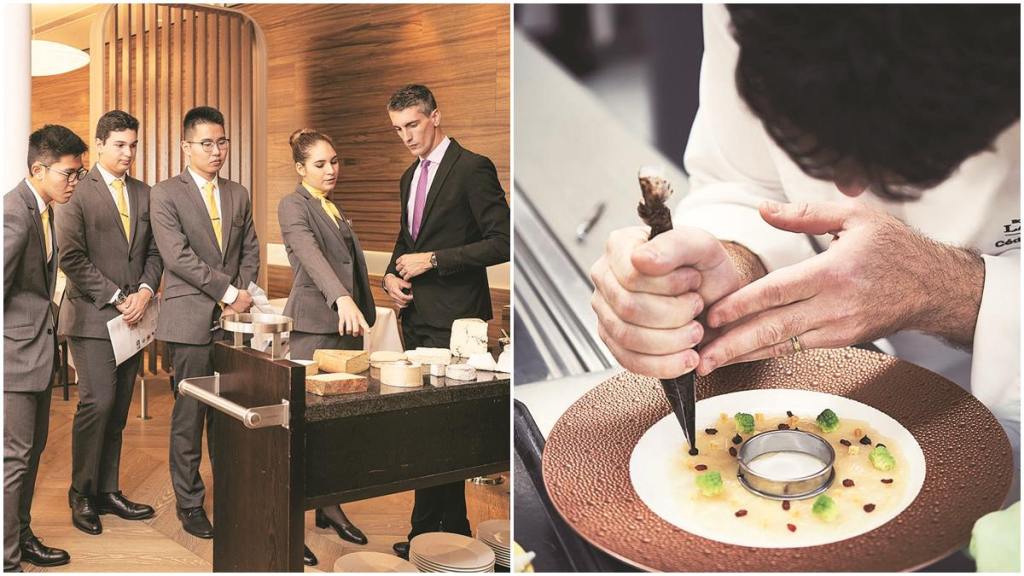It’s human nature to find perfection in imperfection. But when both come together, it becomes a lesson for life. Some exemplary lessons of life are ready to become success stories at Le Berceau des Sens, a fine-dining Michelin-starred educational restaurant located within the campus of EHL Hospitality Business School in Lausanne, Switzerland. That’s because the restaurant, known for its impeccable food and service, is served by an entourage of students while they undergo a compulsory academic two-week training session in the first-year bachelor’s programme in the school.
Extremely organised and patient in teaching the nuances of the French gastronomic experience is head chef Cédric Bourassin, who leads a high-flying brigade of professionals in the restaurant.
What can the guests experience? A readily available entourage of students aged 18-something in smart suits as they remain appropriately discreet about lessons they learn. The students are part of the essential daily briefing, and are trained in all areas of food and beverage, from Monday to Friday, when the restaurant is open to the public.
Warm and confident, all are aware of the origin of the finest Swiss wines from the region. While serving at the table, they gently remark, “Chasselas (a wine grape variety grown mainly in Switzerland) is a non-aromatic variety with low alcohol and is known for yielding neutral grapes. It is the champion white variety that makes up 30% of the nation’s wine production.” Well-trained body movements when serving cheese, wine and French delights with expert-like precision come easy. But don’t be surprised, the 60-seater restaurant is fully booked for the next four months.
Located near the Lake Geneva region and the Swiss Alps, Le Berceau des Sens’ menu includes three-, four- and five-course meals, in a colourful variation of seasonal, locally-sourced ingredients, such as snail cromesquis and a small tartlet haloed with a mushroom mousse; foie gras balls in Kampot pepper, white chocolate and Espelette pepper; black-legged chicken from Gruyère served in a ballotine with a short tamarind sauce and a fine white eggplant puree; Hautes-Alpes lamb marinated in Asian flavours, cooked for a long time at a low temperature under vacuum before being seared, dressed and topped with a short umami-flavoured juice alongside a delicate sea lettuce spring roll.
Also Read: No kidding: From topics to tech, children’s literature is evolving fast
Kitchen service is not easy but since the concept is totally different, there is a need to be a little extra cautious. “The aim is not just to maintain a Michelin-star status but also the learning of students at this fine-dining (restaurant) that has complex flavours and brings a variety of experiences. They have to learn and unlearn in the kitchen, that’s why we involve them in a real restaurant. There is a standardisation of service and cuisine, which a fine dining restaurant has, and the students learn all these,” says Bourassin, who joined EHL in 2016 and has led an international career working for prestigious restaurants and hotels in Europe, Malaysia and Japan, besides obtaining a 3-star Michelin rating for the Michel Bras TOYA restaurant in Japan as head chef and director.
What makes it different from other starred training restaurants is that it has both learning and operations. “I let them work. The less I work and the less I am involved, (the more it will) make them learn in the practice area, which is not the case in other places,” Bourassin adds.
Students go through an evaluation process in the kitchen and dining; not following can get them penalised and their scores deducted. “Some days the jacket is not ironed or if they are late or absent in my class, I penalise them. Most students come raw, so it’s good to follow rules. EHL is a school of life for students where they get general knowledge about fine dining, plating, presentation, procurement of dishes, kitchen and service sector and this ability to work in the kitchen is an important part of the learning management system,” he says.
In close to two decades of working, the chef finds intolerance on food a major obstacle to cooking. “Gluten and celiac intolerance is common nowadays. At the same time, veganism is a big trend but cooking vegetarian fine-dining (dishes) in a gastronomic way is quite tough,” he says.









